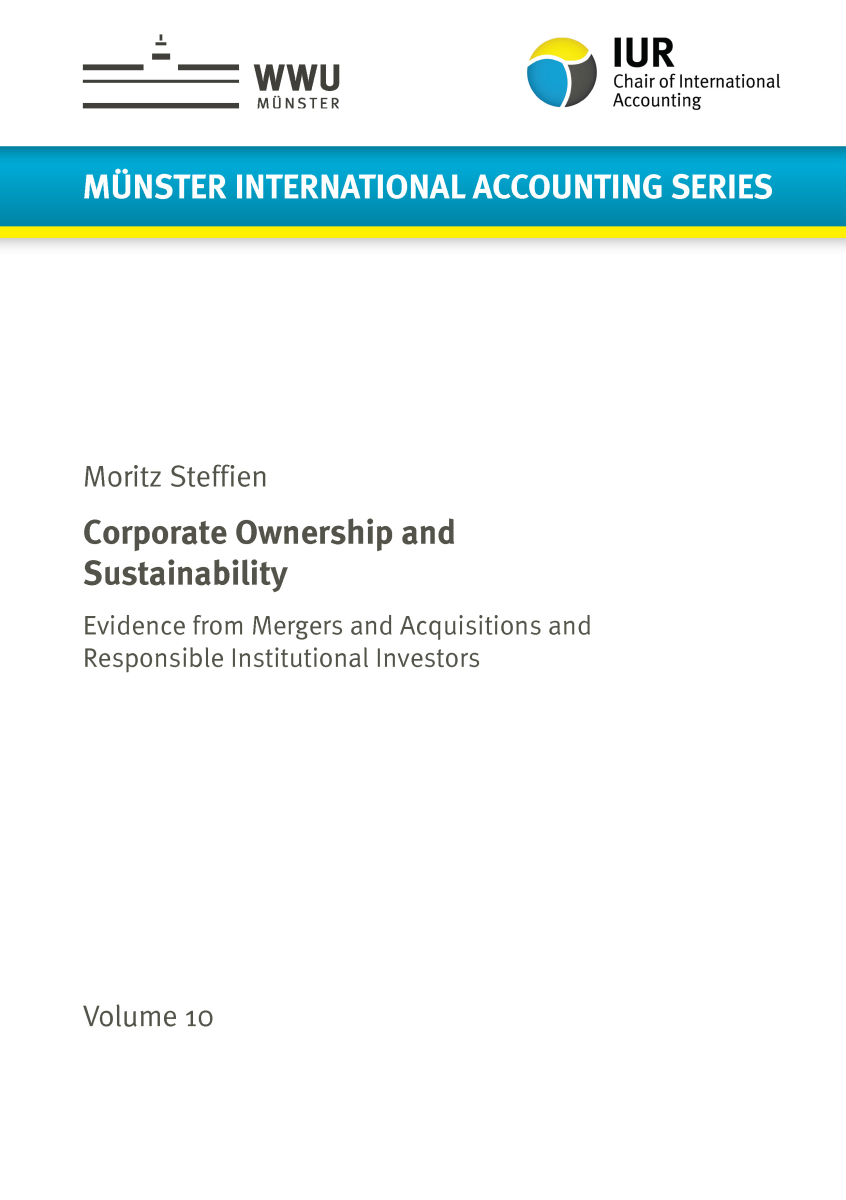Volume 10
Moritz Steffien - Corporate Ownership and Sustainability - Evidence from Mergers and Acquisitions and Responsible Institutional Investors

With natural resource depletion, climate change, and intensifying social inequalities, society is currently confronted with unprecedented threats to sustainable development. On the one hand, this poses a challenge for companies to understand and systematically integrate environmental and social sustainability, often referred to as corporate social responsibility (CSR), into corporate strategies and operational decisions. On the other hand, the slow progress and persistent funding gap in achieving the Sustainable Development Goals (SDGs) call on governments and regulators to take effective action to steer the global economy onto a more sustainable path. Thus, the three studies in this thesis synthesize current knowledge on the role and implications of CSR in the M&A context (study 1), investigate whether ownership by responsible investors drives sustainable M&A activity as well as its outcome (study 2), and examine two potential channels through which targeted transparency requirements for investors drive their engagement on corporate environmental activities (study 3).
The first study (“The Role of Corporate Social Responsibility in Mergers and Acquisitions: A Literature Review and Future Research Directions”) conveys the first systematic review of existing research on the CSR–M&A nexus. Based on 44 articles published in 17 peer-reviewed journals between 2000 and 2022, the review predominantly highlights CSR as a valuable resource for M&A by signaling desirable and compatible company characteristics as well as adherence to stakeholder requirements, which facilitates strategic decision-making and process flows, ultimately leading to superior post-M&A (non-)financial performance. However, the study also identifies contradictory findings and research gaps that offer promising avenues for future research.
The second study (“Do Responsible Investors Drive Sustainable Mergers and Acquisitions and their Outcomes?”) examines how ownership by responsible investors relates to firms’ decision to initiate sustainable M&A and subsequent value creation. Evidence from 478 M&A deals between 2007 and 2019 indicates a positive association between ownership by responsible investors and the likelihood of initiating M&A, especially those involving targets with strong CSR track records. In addition, the study finds that acquirers with higher ownership stakes held by responsible investors earn significantly lower short- and long-term stock returns following M&A, implying that responsible investors compromise financial returns to pursue their sustainability agenda. Overall, this study provides relevant insights into the role of heterogeneous ownership structures in firms’ investment decisions and shows that responsible investors can be an important factor in the global transition toward more sustainable business practices.
The third study (“Driving Responsible Investor Action through Targeted Transparency: Evidence from the UNPRI’s Climate Reporting Requirements”) exploits investor-level climate reporting requirements implemented by the UNPRI to examine two potential channels underlying the impact of targeted transparency regulation on responsible investors’ engagement on portfolio firms’ environmental performance. Drawing on a large international sample, the study finds that investor action on improving portfolio firms’ environmental performance is primarily attributable to external pressure from increased transparency, as opposed to internal learning resulting from the reporting process. Thereby, it informs regulators on the importance and effective design of investor-level targeted transparency regulation.
Collectively, this thesis yields important insights into the intersection of CSR with corporate ownership and its transfers. This way, it assists managers, shareholders, and other stakeholders in understanding CSR and its implications for business operations, particularly M&A, enabling them to adequately address CSR-related issues in decision-making processes. In addition, it offers important guidance to policymakers on potential measures to bring the global economy onto a more sustainable path.


